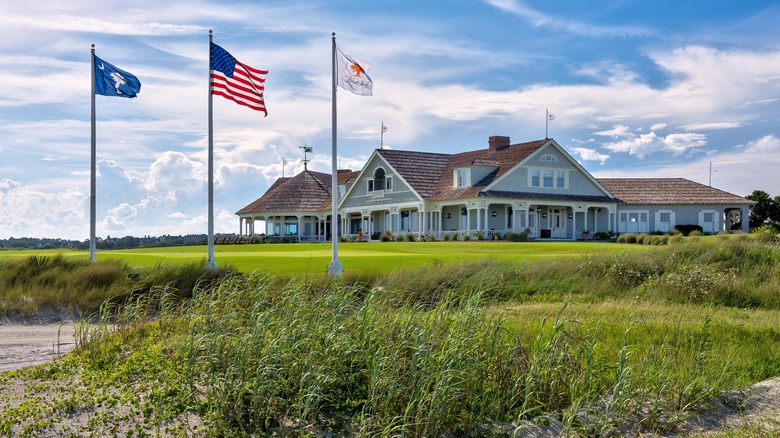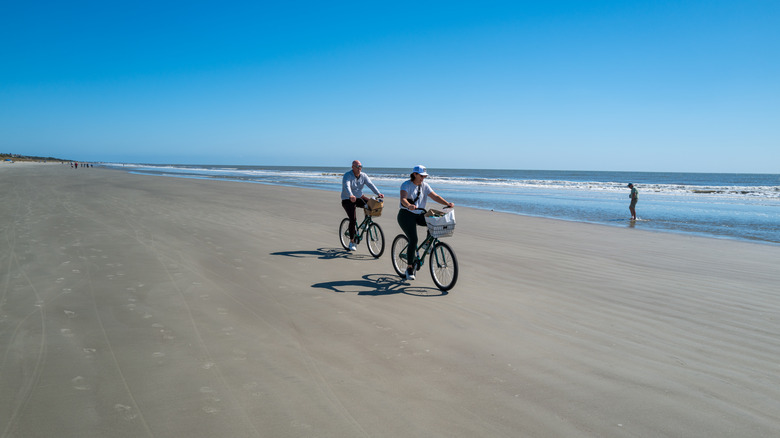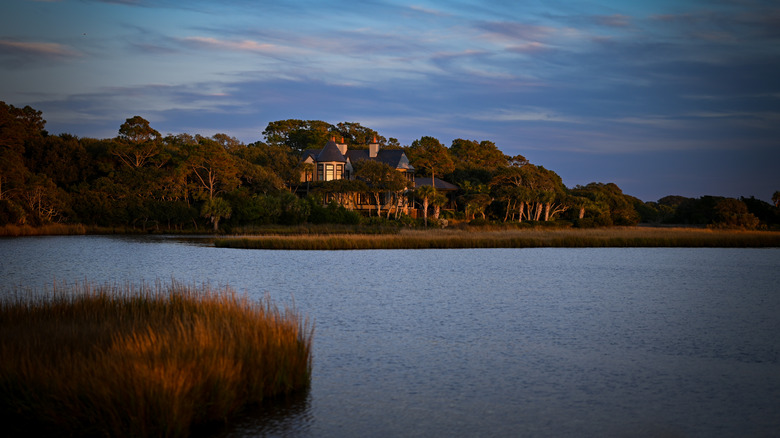South Carolina's Private Barrier Island Is A Luxury Tourist Destination Full Of Recreation
Kiawah Island is a gated, private barrier island and resort community, known for its deliberate development and conservation-minded approach. Kiawah's commitment to preserving forests, dunes, and marshland mirrors the ethos of the East Coast's other stunning beach destinations. While much of its shoreline and amenities are reserved for resort guests and residents, the island still allows public access via Beachwalker Park on its west end, which is part of Charleston County's park system. That duality — seclusion mixed with invitation — is central to Kiawah's appeal.
Just under 28 miles south of historic Charleston, South Carolina, the island feels worlds removed, even though it's only an hour's drive away from Charleston International Airport. Visitors typically fly into Charleston and either rent a car or arrange a private transfer for the last leg. From major Southeastern hubs such as Atlanta, Charlotte, or Raleigh, the island is reachable in under six hours by road, making it a great place to drive to for a gorgeous getaway.
On arrival, guests immediately sense a quiet elegance: miles of maritime forest, wide dunes, salt marshes, and a resort infrastructure that prioritizes nature. The Kiawah Island Golf Resort, which anchors much of the island's amenities, is the gateway for most visitors. The resort hosts dining and lodging,and it acts as the de facto center of public visitor access.
What to do on Kiawah Island
Kiawah is best known for recreation, and luxury recreation at that. The resort maintains five championship golf courses — Ocean Course, Turtle Point, Osprey Point, Cougar Point, and Oak Point — each offering distinctive terrain and views. The Ocean Course, a Pete Dye design, has hosted multiple PGA Championships, and it is often cited as one of the most challenging coastal courses in the U.S. For avid golfers, playing at least one round here is a must.
Beyond golf, Kiawah offers over 30 miles of paved biking and walking trails, which wind through maritime forest, lagoons, and dune-lined coastal areas. Bike rentals are readily available from on-island shops, while guided paddling tours booked via the Heron Park Nature Center bring the island's ecosystems to life. Water-based activities are a big part of the lure, here, including kayaking, paddleboarding, guided eco-tours, and fishing excursions. Meanwhile, Heron Park hosts guided nature programs like birding walks and alligator tours, which highlight Kiawah's rich wildlife.
One standout experience is the Mingo Point Oyster Roast and BBQ, held Monday evenings in summer and on most major holidays. Guests enjoy live music, oysters roasted over an open fire, pig pickin', and a festive, family-friendly atmosphere. It's a Lowcountry tradition worth timing your trip around. Dining and ambiance also rank among Kiawah's draws. The resort offers more than a dozen restaurants, from the upscale Atlantic Room at the Ocean Course to more casual fare at Cherrywood BBQ & Ale House. Reservations are required for dinner.
Plan your trip to Kiawah Island
When it comes to accomodation, Kiawah offers a spectrum of luxury. The flagship is The Sanctuary, a Forbes Five-Diamond beachfront hotel with spa services, multiple restaurants, and upscale amenities. For those who prefer more space, waterfront villas and vacation homes are available through resort-approved rental programs. Staying through Kiawah's rental arm unlocks shuttle service, preferred dining, and access to amenities. Nightly rates vary by season and unit type, but high-end rooms at The Sanctuary can exceed several hundred dollars per night, and the presidential suite can cost up to $1,850 nightly. Golfers can take advantage of bundled packages, which include lodging and play, but these are customizable and prices can vary.
The best times to visit Kiawah are late spring through early fall, when the beaches and water experience peak conditions for recreational activities. The fall and spring shoulder seasons are ideal for golfers seeking fewer crowds and slightly cooler weather. Winter visits are quieter and can still be beautiful, although swimming is rarely ideal. Smart travelers should pack swimwear, reef-safe sunscreen, insect repellent, a good pair of walking shoes, binoculars for birdwatching, and a light jacket for breezy evenings.
One caveat is that many of the island's amenities — including the golf courses, shuttle service, and dining privileges — are accessible only to resort guests or villa renters. Beachwalker Park is the sole widely accessible public beach. So, when planning, ensure your lodging is affiliated with the resort system to enjoy the full experience. And while Kiawah leans into refined recreation and resort amenities, nearby islands such as Daufuskie offer an alternative option for a charming coastal vacation, with minimal infrastructure, historic Gullah culture, and a quieter sense of immersion in the Lowcountry landscape.


